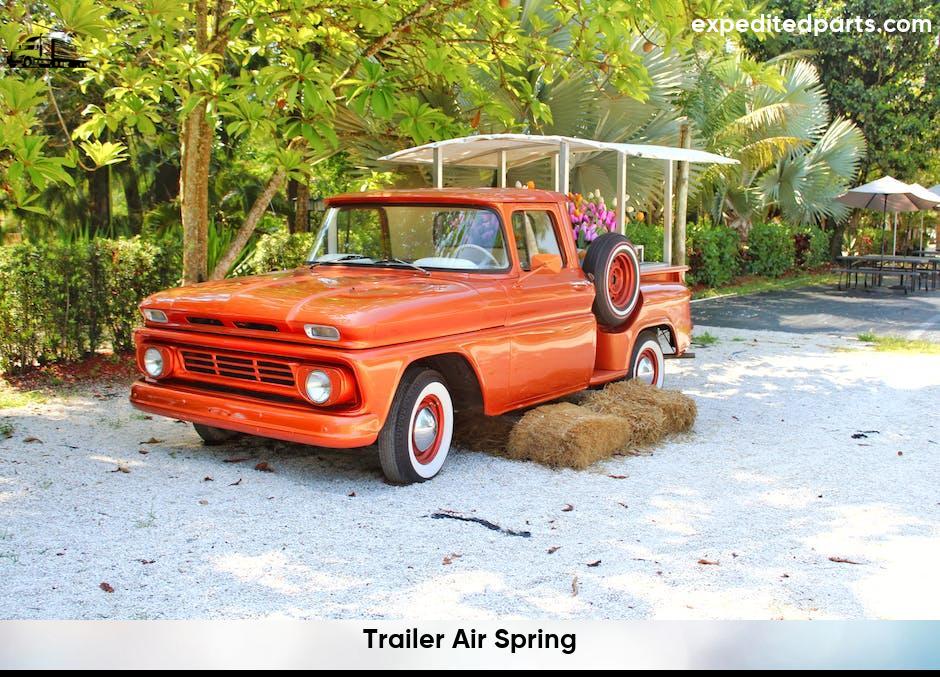Discover the power of Trailer Air Springs! Enhance your trailer’s suspension system for smoother rides and better load stability.
Trailer air springs play a vital role in the suspension system of trailers, providing a smooth and comfortable ride while ensuring safety and stability on the road. These air springs, also known as air bags or air suspension bellows, are designed to support the weight of the trailer and its cargo, absorbing shocks and vibrations caused by uneven road surfaces. By utilizing compressed air, they can adjust the suspension height and provide a level ride, regardless of the load. This not only enhances the overall performance of the trailer but also reduces wear and tear on other components, such as tires and axles. With their durability and reliability, trailer air springs have become an essential component in the transportation industry, improving the efficiency and safety of trailer operations.
The Ultimate Guide to Trailer Air Springs: Everything You Need to Know
Here is everything you need to know about trailer air springs:
- Function: Trailer air springs are designed to support the weight of the trailer and its load, providing a smooth and stable ride. They work by utilizing compressed air to absorb and dampen vibrations and bumps along the road.
- Improved Suspension: One of the key benefits of trailer air springs is their ability to improve suspension. By adjusting the air pressure, you can alter the ride height and stiffness of the suspension, ensuring optimal performance and comfort.
- Load-Leveling: Trailer air springs are especially useful for load-leveling. When towing heavy loads, the weight distribution may become uneven, leading to sagging or swaying. Air springs help distribute the weight evenly, reducing stress on the trailer frame and tires.
- Easy Installation: Installing trailer air springs is relatively straightforward. They can be mounted to the trailer’s suspension system and connected to an air supply system. Many air spring kits come with detailed instructions, making the installation process hassle-free.
- Durable and Reliable: Trailer air springs are built to withstand the demands of towing. They are made from high-quality materials, such as durable rubber and strong steel components, ensuring long-lasting performance and reliability.
In conclusion, understanding trailer air springs and their benefits is vital for anyone who regularly tows trailers. By utilizing these innovative suspension components, you can enhance stability, improve ride quality, and ensure the safety of your cargo.
: Unveiling the Benefits of Trailer Air Springs: How They Improve Suspension
Unveiling the Benefits of Trailer Air Springs: How They Improve Suspension
Here are the key benefits of trailer air springs in improving suspension:
- Reduced Vibrations: Air springs act as shock absorbers, dampening vibrations caused by uneven road surfaces. This results in a smoother ride and reduces the risk of damage to cargo or the trailer’s structural integrity.
- Adjustable Ride Height: One of the notable advantages of trailer air springs is their ability to adjust the ride height. By varying the air pressure, you can fine-tune the trailer’s suspension to accommodate different loads or road conditions, ensuring optimal performance and comfort.
- Load-Bearing Capacity: Trailer air springs have a high load-bearing capacity, making them suitable for heavy-duty towing. They can handle substantial loads without compromising the stability and handling of the trailer.
- Absorption of Road Shock: The air springs’ design allows them to absorb and dissipate road shock, reducing the impact on the trailer’s suspension and enhancing overall ride quality. This helps protect the trailer’s frame, tires, and cargo.
- Improved Tire Life: Properly functioning air springs help distribute the load evenly across the trailer’s tires. This prevents uneven tire wear and prolongs the life of the tires, ultimately saving you money on replacements.
: Choosing the Right Trailer Air Spring: Factors to Consider
Choosing the Right Trailer Air Spring: Factors to Consider
When it comes to selecting the right air spring for your trailer, there are several factors you need to consider. Making the right choice can greatly impact the stability, performance, and overall ride quality of your trailer. Here are some key factors to keep in mind:
- Adjustability: Consider whether you need an air spring with adjustable pressure. Adjustability allows you to fine-tune the suspension to accommodate varying loads or road conditions.
- Compatibility: Ensure that the air spring you choose is compatible with your trailer’s suspension system. Check the measurements, mounting options, and any additional accessories required for installation.
- Ride Quality: Consider the level of comfort you desire while towing your trailer. Some air springs are designed to provide a smoother ride by reducing vibrations and bumps on the road.
- Cost: Evaluate your budget and weigh it against the features and benefits offered by different air spring options. Keep in mind that investing in a high-quality air spring can ultimately save you money in the long run by reducing maintenance and potential damage to your trailer.
: Revolutionize Your Trailer’s Ride with Air Springs: A Game-Changing Technology
Revolutionize Your Trailer’s Ride with Air Springs: A Game-Changing Technology
Gone are the days when trailers had to endure bumpy and uncomfortable rides. Thanks to air springs, which have emerged as a game-changing technology, you can now revolutionize your trailer’s ride and enjoy a whole new level of comfort and performance.
Air springs, also known as airbags or air suspension systems, are designed to replace traditional steel or leaf springs in trailers. They utilize compressed air to support the trailer’s weight and absorb shocks from the road surface.
Why should you consider air springs for your trailer? Here are some compelling reasons:
- Adjustability: With air springs, you have the ability to adjust the air pressure to suit the load on your trailer. This allows you to maintain optimal ride height, improve stability, and evenly distribute the weight, regardless of the load you’re carrying.
- Enhanced Safety: Air springs contribute to better handling and braking performance by reducing trailer sway and improving stability. This can help prevent accidents and provide peace of mind while towing.
- Versatility: Air springs can be used in various trailer applications, including utility trailers, recreational vehicles, horse trailers, and more. They are available in different designs and sizes to accommodate different trailer types and load requirements.
Enhance Safety and Stability: How Trailer Air Springs Improve Towing
Here are some ways in which trailer air springs can improve towing:
1. Load-leveling: Trailer air springs are designed to automatically adjust and distribute the weight of the trailer. This helps to maintain a level ride height, preventing the trailer from sagging at the rear or being lifted at the front. By keeping the trailer in a balanced position, air springs enhance stability and reduce the risk of swaying or fishtailing.
2. Improved steering control: The even weight distribution provided by trailer air springs also improves steering control. By minimizing the impact of uneven weight distribution, they help to keep the towing vehicle aligned and minimize the risk of oversteering or understeering.
3. Smoother ride: Trailer air springs act as shock absorbers, reducing the effects of bumps and vibrations on the towing vehicle. This results in a smoother ride for both the driver and any passengers in the vehicle.
5. Enhanced braking performance: The improved stability provided by trailer air springs translates to better braking performance. The towing vehicle can stop more effectively, reducing the risk of accidents or collisions.
- Load-leveling: Automatically adjust and distribute weight for a balanced ride
- Improved steering control: Minimize the impact of uneven weight distribution
- Smoother ride: Act as shock absorbers to reduce bumps and vibrations
- Enhanced braking performance: Improve stopping power and reduce accidents


